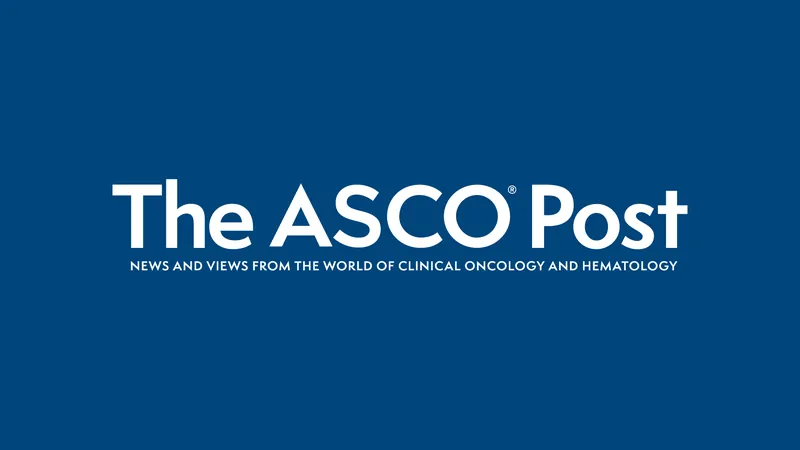
Impressive Advances in Neoadjuvant Therapy for Triple-Negative Breast Cancer and More Breakthroughs in Oncology
2024-11-08
Author: Ming
Transformative Results from the KEYNOTE-522 Trial
At the ESMO Congress 2024, Dr. Peter Schmid unveiled pivotal results from the phase III KEYNOTE-522 trial, revolutionizing treatment strategies for early-stage triple-negative breast cancer. The trial, involving 574 women, demonstrated that neoadjuvant therapy with pembrolizumab paired with chemotherapy resulted in a statistically significant survival advantage — a hazard ratio of 0.66 with a five-year survival rate of 86.6% compared to 81.7% for those receiving chemotherapy alone. These findings support FDA approval for pembrolizumab in high-risk patients and underscore its potential to improve outcomes across diverse tumor profiles and patient demographics.
WHO Study Raises Eyebrows on Mobile Phones and Cancer Risk
A comprehensive review commissioned by the World Health Organization has reexamined the concerns surrounding mobile phone radiation and brain cancer. Analyzing 63 studies conducted over nearly three decades, researchers found no significant correlation between mobile phone usage and increased brain cancer incidence, despite the evolution of wireless technology. This outcome could lead to a reevaluation of the "possibly carcinogenic" classification by WHO, with expectations for new guidance by early 2025.
Mixed Results for Metastatic Renal Cell Carcinoma Therapy
The phase III TiNivo-2 trial's findings, reported in The Lancet, provide crucial insights into treatment options for metastatic renal cell carcinoma. Researchers found that rechallenging patients with nivolumab and tivozanib did not improve progression-free survival over tivozanib alone, which demonstrated a median survival of 7.4 months. Consequently, medical professionals may reconsider the use of immune checkpoint inhibitors in this context.
Disappointing Outcomes from the SOLARIS Trial on Colorectal Cancer
The SOLARIS trial (Alliance A021703) investigated the impact of high-dose vitamin D3 alongside standard treatment for metastatic colorectal cancer. Involving over 450 patients, researchers found no significant advantage in survival compared to standard-dose vitamin D3, despite high dosing not leading to additional side effects. However, new pathways for further investigation may emerge as certain patient subsets show promise.
Increasing Breast Cancer Incidence Among Certain Demographics
The American Cancer Society's 2024 Breast Cancer Statistics report reveals a 44% decline in mortality rates since 1989, translating to approximately 517,900 lives saved. However, alarming disparities continue, especially among American Indian and Alaska Native women, where rates remain unchanged. Notably, there has been a 1% annual increase in breast cancer incidence from 2012 to 2021, particularly among women under 50 and Asian American/Pacific Islander populations. This highlights the urgent need for enhanced access to early detection and treatment programs, exemplified by initiatives such as the VOICES of Black Women study.
Adjuvant Chemotherapy's Role in Pancreatic Ductal Adenocarcinoma
A recent study in the Journal of Clinical Oncology examined the effectiveness of adjuvant chemotherapy in resected pancreatic ductal adenocarcinoma. Out of 1,031 patients analyzed, 63.5% received chemotherapy, and findings indicated substantial survival benefit for those with node-positive disease and high CA19-9 levels. The authors emphasized that randomized trials are essential for validating these outcomes, particularly as treatment approaches become more individualized.
Genetic Insights for Prostate Cancer in African Men
Emerging research suggests that unique genetic risk factors influence prostate cancer incidence among African men. The Nature Genetics study identified three specific loci tied to an increased risk of the disease, differing from those found in European populations. This discovery underscores the critical need for tailored screening and treatment protocols that address the genetic diversity among African populations, aligning with efforts to enhance cancer care across the continent.
Promising New Drug: Puxitatug Samrotecan
In an exciting development, the first-in-human trial results for the novel antibody-drug conjugate puxitatug samrotecan have shown a favorable safety profile and early signs of efficacy in patients with advanced solid tumors. This innovative treatment targets the B7-H4 protein and utilizes a topoisomerase 1 inhibitor to disrupt cancer cell replication. In a phase I/II trial of 47 patients, 20.5% achieved partial responses, suggesting potential for broader application pending further studies.


 Brasil (PT)
Brasil (PT)
 Canada (EN)
Canada (EN)
 Chile (ES)
Chile (ES)
 España (ES)
España (ES)
 France (FR)
France (FR)
 Hong Kong (EN)
Hong Kong (EN)
 Italia (IT)
Italia (IT)
 日本 (JA)
日本 (JA)
 Magyarország (HU)
Magyarország (HU)
 Norge (NO)
Norge (NO)
 Polska (PL)
Polska (PL)
 Schweiz (DE)
Schweiz (DE)
 Singapore (EN)
Singapore (EN)
 Sverige (SV)
Sverige (SV)
 Suomi (FI)
Suomi (FI)
 Türkiye (TR)
Türkiye (TR)